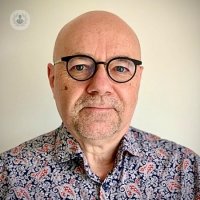Sit back and relax: Treating herniated disc pain
Written by:One of the most frustrating - and painful - things that can happen to people with a herniated disc is that they may be unable to sit down.
Thankfully, there are emerging new pain management methods such as regenerative medicine offering relief from this and other painful symptoms. Dr Zbigniew Kirkor, highly-skilled consultant in anaesthesia and pain medicine, speaks to Top Doctors about how herniated disc patients can get back to a previous quality of life in this informative article.

How do I know if pain is muscular or related to a herniated disc?
Pain emerging from a herniated disc is very distinctive. It’s usually localised in the midline of the spine. Bending backward or returning from forward bending makes the pain worse. Often, pain radiates down the lower limb as sciatic pain. It can be associated with various sensations, such as:
- Water trickling down the leg;
- Burning;
- Pins and needles, and so on.
Very often, patients report relief when lying down on a hard surface. Also, they are usually unable to sit down. Muscular pain doesn’t radiate to the lower limbs, and it’s often is localised a bit to the side of the spine. Often, it’s less intense and is relieved by heat, such as a hot bath, a hot water bottle and so on.
How do you relieve herniated disc pain?
Acute disc pain usually subsides spontaneously over time. Often physical therapy is helpful. Regenerative medicine offers an attractive treatment option, as well. Sometimes surgical intervention is required but it should always be the last resource. The only exception, when immediate surgery may be required, is when patient becomes incontinent. It means that the disc is compressing on important nerves in the spine and this pressure must be relieved with surgery.
Does a herniated disc cause pain in other parts of the body?
Herniated disc can touch the nerve emerging from the spine and run down to the lower limb. In such cases, patients will present with sciatic pain. Sometimes the disc doesn’t touch the nerve but the disc’s contents leak out. In such cases, it causes chemical irritation of the nerve and leads to sciatica.
How would a pain management specialist help to manage disc pain?
Most of the traditional pain management methods fail to relieve disc pain. A very attractive, promising new method involves regenerative medicine. There is a growing body of evidence that platelet rich plasma and bone marrow aspirate, containing stem cells are able to alleviate disc and sciatic pain. The treatment is safe and carries less risks than other methods.
Are there any exercises I can do to relieve disc pain?
Exercises are a vital part of successful recovery from disc pain. They should be provided by a professional therapist. It’s also important to realise that a strong, healthy spine often prevents disc problems so certain exercises actually play a preventive role as well.
Interested in regenerative medicine for a herniated disc? Arrange a consultation with Dr Kirkor via his Top Doctors profile.


